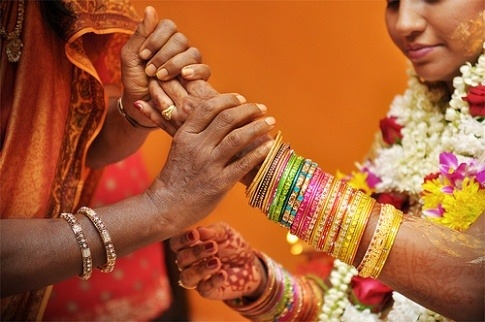
4 Fun Festivals To Celebrate During Pregnancy
9 Feb 2014 | 5 min Read
Baby Chakra
Author | 501 Articles
There are many events and celebrations associated with pregnancy. It’s a phase of joy and celebration- not just for the parents-to-be but for friends and family too! In India, there are several pregnancy celebrations. In fact, among the 16 samskaras are accepted as the rites of passage in a Hindu’s life. 3 of them are associated with conception and pregnancy. Simantonnayana, the third samskara, has endured over the years and is celebrated all over the country. But it is called by different names and has other elements, depending on the region and culture. But essentially, it is about welcoming a new baby into the world, and showering goodwill and gifts on the mother-to-be and wishing her the joys of motherhood. Now let’s know more about the exciting festivals and fun things to do while pregnant.
Interesting Pregnancy Celebration Ideas to Celebrate Motherhood When You Are Pregnant
1. Godh Bharai
Image Source: navbharattimes
Godh Bharai (literally, “filling the lap”) is one of the pregnancy celebration ideas celebrated in the northern part of India. This pregnancy celebration is usually performed after the seventh month, probably because it is assumed that the pregnancy is now stable. On this day, you’ll be dressed in a brand new saree, adorned with flowers and decked with jewellery. Expect lots of gifts- ranging from fruits to gold! The ceremonial Kumkum is applied to your forehead, followed by Aarti. The joyous pregnancy celebration calls for loads of singing and merriment, and relatives sing several traditional songs. Once the Godh Bharai pregnancy celebration function is over, you will, in all probability, be heading to your parent’s home for the rest of the pregnancy term and delivery.
2. Shreemanta/Seemantam/Valakaappu
Image Source: images.squarespace-cdn
These are some of the names by Hindu families in Southern India that celebrate this pregnancy celebration. Your in-laws will oversee the arrangements (so being in their excellent books might be a good idea!). Ceremonies will vary from family to family; some families opt for very elaborate poojas seeking blessings for you and the baby, while others are happy with simple rituals. Traditionally, these pregnancy celebrations events were ladies-only, but men are also included nowadays.
You can expect that Families will hold the function in the fifth, seventh or ninth month of your pregnancy. You will don green bangles (symbol of fertility), and receive tons of gifts! If people don’t get gifts for your baby, don’t be offended- old traditions say that gifts for the baby are bad luck. The custom was probably introduced in the old days to avoid disappointment and heartbreak since infant mortality was high. But things are different now, and you can happily accept gifts meant for your baby.
3. Dohale Jeevan
Image Source: i.ytimg.com
A similar event in Maharashtra is called Dohale Jeevan. Translation: satisfying the food cravings of a pregnant lady. The name says it all! The sentiments and events around it are very similar to Godh Bharai – you’ll wear a beautiful new sari and glittering ornaments; there will be lots of traditional songs and specially cooked dishes. There’ll be lots of people wishing you and your baby well, giving presents, and sharing in your joy
4. Baby Shower
Image Source: static.toiimg
These traditional pregnancy celebrations are sometimes combined with the western concept of a Baby Shower. A Baby Shower is a party held by your friends before your baby is born. The term ‘Baby Shower’ came into use because Families showered the gifts on the mom-to-be. The offerings were put in an umbrella in the Victorian era and opened over the mom-to-be’s head! Yippee!
Your friends and co-workers will indulge you and present gifts that will be useful during late pregnancy, early motherhood and post-pregnancy. You can be pretty sure of receiving items that will be of great use once the baby arrives.
Traditionally, baby showers were held for only the firstborn. Still, there are baby showers for subsequent children, and sometimes, there are multiple baby showers for the same child, organized by different circles of friends.
There are similar traditions elsewhere, like Saadh in Eastern India and Pulakuli in Kerala. Muslims and Sikhs might not have a specific practice, but they honour their pregnant women in similar ways and commemorate the new life of the mother-to-be with gifts and good cheer.
Whether it is a formal event or a baby shower, you thankfully won’t have much to do except sit back and enjoy all the attention! Make sure that you take plenty of rest before and after the event and watch what you eat. It would be a nice gesture to send a heartfelt ‘thank you’ message to everybody for their presence at the event and their gifts.
Depending on your inclination and interest, feel free to celebrate your pregnancy as you deem fit. Whatever the customs or traditions you follow (or don’t follow!) don’t matter because all these pregnancy celebrations have one common element – everybody wants to partake in your joy and wishes the very best for you and your child!
Related Articles
Learn Babyshower Ideas: Here is your ultimate guide to exploring baby shower ideas. Check out all of them here!
Awesome Baby Shower Games To Liven Up The Party: Here are some baby shower games meant for everyone that can liven up the party and set the awesome vibes.
Fun Rituals For An Indian Baby Shower: Here are fun rituals to celebrate the joy of the soon-to-arrive baby and of motherhood.
Banner Image Source: patheos.com
A


Related Topics for you
Suggestions offered by doctors on BabyChakra are of advisory nature i.e., for educational and informational purposes only. Content posted on, created for, or compiled by BabyChakra is not intended or designed to replace your doctor's independent judgment about any symptom, condition, or the appropriateness or risks of a procedure or treatment for a given person.
